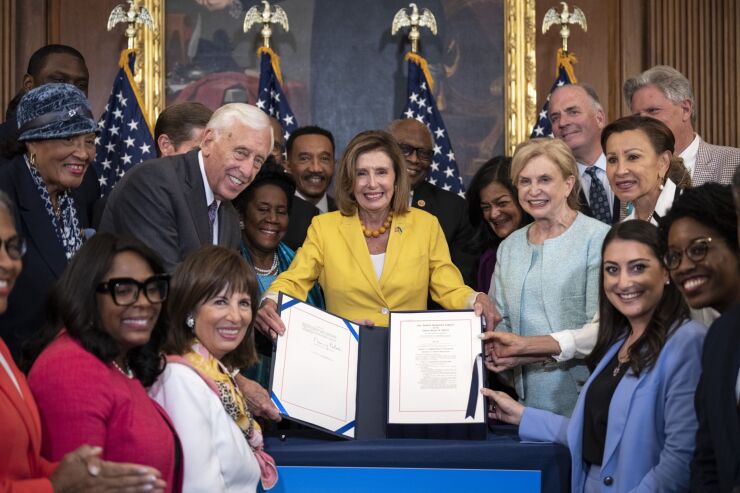The Inflation Reduction Act of 2022, a 300-page scaled-back version of prior Biden administration proposals for Build Back Better, passed the House by a 220-207 vote on Aug. 12, 2022, followed by passage in the Senate by the narrowest of margins, 51-50, with a tie-breaking vote cast by Vice President Kamala Harris.
The act includes the extension and expansion of Green Energy Incentives, a corporate alternative minimum tax of 15% on book income, an excise tax on stock repurchases, and an extension of Affordable Care Act premium reductions. It also contains a massive increase in funding for the IRS to improve customer service and close the tax gap.
While for many the highlight of the bill is its focus on encouraging and transitioning to "green energy," it affects a broad range of other issues.
"The main provisions for non-green issues are health care and IRS funding," said Mark Luscombe, principal analyst at Wolters Kluwer Tax & Accounting. "Almost $80 billion is slated for the IRS. The biggest chunk of that is $45.6 billion for enforcement, and $25.3 billion for operations support, which entails hiring additional people. $4.7 billion is for business systems — upgrading computer systems, which could also help with enforcement. Then $3.2 billion would go to taxpayer services. One fairly interesting item is for a study on the IRS going to a direct trial procedure for filers that don't use a third-party provider."
This is a large increase for the IRS, Luscombe observed. "Their annual budget is usually in the $14 billion range, so this is huge," he said. Republicans critical of the act say it will mean 80,000 more agents coming after you, but [Treasury Secretary Janet] Yellen said they won't use the additional funding to increase audits of people making less than $400,000 above historic levels. The reference to 'historic levels' gives the IRS some flexibility, because IRS audit rates have been going down for several years. These rates could increase in going back to 'historic levels.'"
Virtually every group has been supportive of giving increased funding to the IRS, observed Roger Harris, president of Padgett Business Services.
"Now that they have it, let's be patient and see what they do with it. A voluntary system needs to have enforcement measures. When you sit down and do your taxes honestly, you expect that others are doing honestly as well. If it all fits together, we should see gradual improvement in all areas of the IRS."

Other provisions
The act contains an allocation of $300 billion for deficit reduction, Luscombe noted: "A lot of people view this as inflation-reducing, but a lot also question whether that number is valid or not."
While not a tax, the item drawing the most attention in the health care portion is the ability of Medicare to negotiate drug prices, said Luscombe. "It's scheduled as a phase-in. They're directed to focus on the highest cost, most widely used drugs. The first year they would target 20 drugs, and then an additional 15 each year. Medicare itself can save money, and users would get the benefit of lower drug prices as well. Added to that, and highly touted as important, is an annual cap on out-of-pocket costs for recipients, set at $2,000 per year."
The carried interest modifications were dropped at the behest of Sen. Kyrsten Sinema, D-Arizona. Inorder to make up for the loss in revenue, the act imposes a 1% excise tax on stock buybacks to apply to repurchases of stock after Dec. 31, 2022.
"A big revenue raiser is the alternative minimum tax on adjusted financial statement income for large corporations. It only applies to corporations with book income over $1 billion dollars, which could be only about 200 corporations," said Luscombe. "The [Organization for Economic Cooperation and Development] is also trying to get countries to implement a 15% minimum tax, but for various reasons this will likely not meet the OECD requirements."
The Inflation Reduction Act extends the Tax Cuts and Jobs Act's limitation on excess business losses of noncorporate taxpayers for two more years, through 2027," said Luscombe. "It also provides expansion of the R&D Credit for small businesses by an additional $250,000 toward the Medicare tax, in addition to the $250,000 that can be applied against payroll tax liability."
(For more on the act, see Mark Luscombe's recent





